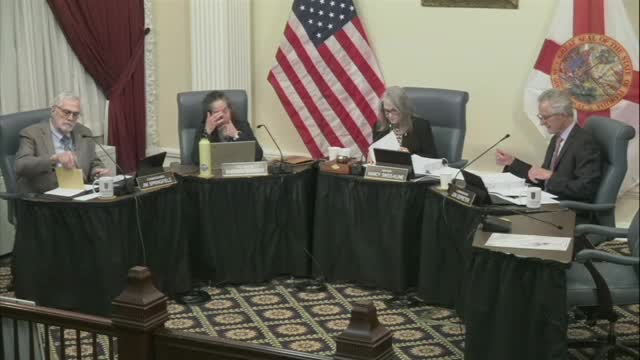St. Joseph Academy annexed; commission approves land‑use and rezoning ordinances, advances PUD super‑majority change
Get AI-powered insights, summaries, and transcripts
Subscribe
Summary
The City Commission of St. Augustine voted unanimously Tuesday to annex roughly 39.8 acres that include the St. Joseph Academy campus into the city and to adopt matching future‑land‑use and rezoning changes for the property.
The City Commission of St. Augustine voted unanimously Tuesday to annex roughly 39.8 acres that include the St. Joseph Academy campus into the city and to adopt matching future‑land‑use and rezoning changes for the property.
The annexation (Ordinance 2024‑01), the future‑land‑use amendment from St. Johns County Residential D to the city’s institutional category (Ordinance 2024‑02), and the rezoning from St. Johns County RS‑3/OR to the city’s Open Land (OL) zoning (Ordinance 2024‑03) all passed on second reading after the city’s planning director summarized the staff recommendation and the Planning & Zoning Board’s earlier action.
Why it matters: The city manager and staff said the move is intended to regularize municipal services and liability for campus security and to align public‑safety coverage with other locally served schools. The property is tax‑exempt as a church‑owned school and will remain so, but the commission and staff said the annexation removes legal awkwardness that existed when city police provided security outside the city limits.
Planning staff presentation and public comment Amy Skinner, the city’s director of Planning and Building, told the commission the three items were related and had been recommended by the planning board after staff obtained corrected surveys and legal descriptions. The items had already cleared first reading in February 2024.
Three members of the public who live near the campus spoke during the public hearing. Melinda Ricansaye asked detailed financial questions about whether the city would absorb additional infrastructure or service costs because the property is tax‑exempt; BJ Kaledi and others asked whether the school is connected to city utilities and whether routine services (trash, water, fire fees) or special events (fireworks) would change after annexation. Staff answered that the campus is already on city water and sewer, that the city will collect a fire fee for service, and that the school will enter into a contract for police security now that the campus lies within city limits.
Commission action and vote Commissioners voted by roll call on each ordinance. The clerk recorded unanimous votes in favor for Ordinances 2024‑01, 2024‑02 and 2024‑03. The mayor noted the items had a prior first reading and that the annexation would make it easier for the city to provide police security without the liability concerns raised by having an officer assigned outside the city boundaries.
First reading: PUD super‑majority ordinance The commission also held extended debate on Ordinance 2025‑01, a first reading ordinance that would change the city code to require a super‑majority vote to establish or amend Planned Unit Developments (PUDs). City Attorney (on the record) explained how a super‑majority formula (a simple majority plus one) would play out when the commission has absences or recusals: when the commission is down to three members, a super‑majority requirement could effectively require unanimity of the three.
Commissioners divided on the policy and precedent. Supporters, including the mayor, said PUDs can substantially change community character and that a higher voting threshold would give the city more leverage to secure public benefits and protect neighborhoods. Critics warned a super‑majority requirement could be gamed by a single commissioner or discourage applicants from choosing the PUD route, which can allow negotiated public benefits that standard rezoning does not. Several commissioners asked staff to return with additional process clarifications and suggested administrative changes—comparative public‑benefit tables, clearer application summaries and tiering of PUD types—so the planning board and public can better evaluate tradeoffs.
The ordinance passed on first reading and was set for a public hearing and second reading at a later meeting; staff indicated the change will go to the Planning & Zoning Board for review of both the voting change and the related process clarifications.
What’s next The annexation, future‑land‑use change and rezoning are effective following the city's usual second‑reading procedures. The PUD super‑majority ordinance will return for a public hearing and final action after Planning & Zoning Board review of the proposed code changes and related administrative improvements.
